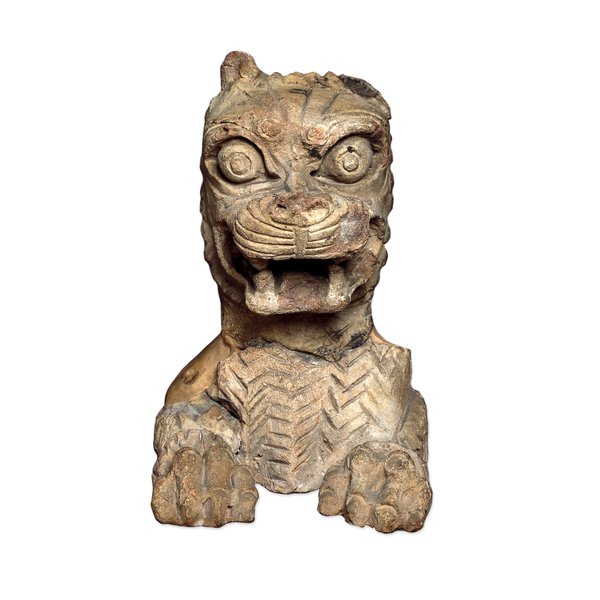التراكوتا شخصية لحيوان
Terracotta figure of an animal
التراكوتا شخصية لحيوان
السلالة البابلية الجديدة، 700-500 ق.
من بلاد ما بين النهرين
وكان هذا الحيوان ربما مقدس لإله أو إلهة، وكان جزءا من مجموعة أكبر تمثال أو حلية المعبد. الكلب جالسا يحدث أولا كرمز الإلهي في الفترة البابلية القديمة ويستمر حتى البابلية الجدد (550 قبل الميلاد). نقوش التعرف عليه باعتباره رمزا لغولا، إلهة الشفاء. الملك نبوخذ نصر الثاني (604-562 قبل الميلاد سادت) المحاضر في وضع من الذهب والفضة والبرونز وعروض الكلاب في بوابات المعبد وغولا في بابل.
في الآشورية الجدد والنيو البابلي حقب (1000-539 قبل الميلاد) الكلب ، والجلوس أو الوقوف، وكان يستخدم أيضا بوصفه شخصية واقية سحرية ، لا تعلق على وجه التحديد إلى أي ألوهية الفردية. وقد أصبحت هذه النماذج متزايد الأهمية لأنه قد قيل إن مرض داء الكلب كان موجودا في بلاد ما بين النهرين في بداية الألف الثاني قبل الميلاد وأكثر انتشارا خلال الألف الأول قبل الميلاد.
المتحف البريطاني
///////////////////////////////////////////////
Terracotta figure of an animal
Neo-Babylonian dynasty, 700-500 BC
From Mesopotamia
This animal was probably sacred to a god or a goddess and was part of a larger statue or temple ornament. The sitting dog occurs first as a divine symbol in the Old Babylonian period and continues through to the Neo-Babylonian (550 BC). Inscriptions identify it as the symbol of Gula, goddess of healing. King Nebuchadnezzar II (reigned 604-562 BC) records the placing of gold, silver and bronze dogs as offerings in the gates of Gula's temple at Babylon.
In the Neo-Assyrian and Neo-Babylonian Periods (1000-539 BC) the dog, sitting or standing, was also used as a magically protective figure, not attached specifically to any individual deity. Such models may have become increasingly important because it has been suggested that the disease of rabies was present in Mesopotamia by the beginning of the second millennium BC and more widespread during the first millennium BC.
The British Museum
Check: http://www.britishmuseum.org/explore...an_animal.aspx
للمزيد الرجاء الأطلاع على // for more please visit
:: سلسلة أثريات ولوحات من بلادي ::







 رد مع اقتباس
رد مع اقتباس
